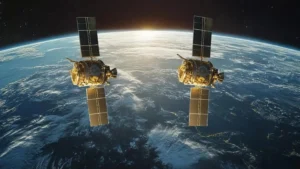Why Has ISRO Postponed the SpaDeX Space Docking Experiment Again?

The Indian Space Research Organisation (ISRO) has delayed its much-anticipated Space Docking Experiment (SpaDeX) for the second time. Originally slated for Tuesday and rescheduled for Thursday, the docking attempt was further postponed on Wednesday due to excessive drift between the mission satellites during manoeuvres. While ISRO has yet to announce a new date, officials have assured that the satellites remain safe, and updates are expected soon.
SpaDeX Objectives and Significance
SpaDeX aims to demonstrate critical technologies for spacecraft rendezvous, docking, and undocking. It involves two 220-kg satellites launched on December 30 via the Polar Satellite Launch Vehicle (PSLV). Currently in a 470-km circular orbit, these satellites will perform complex docking manoeuvres crucial for future missions such as satellite servicing, space station operations, and interplanetary travel.
Mission Details and Challenges
The mission involves a chaser and target satellite moving at speeds of 28,800 km/h, appearing stationary due to their zero relative velocity. The chaser will gradually approach the target, closing the distance to 5 km, then 1.5 km, 500 m, and finally 3 m for docking. At the moment of contact, the chaser will move at an ultra-slow speed of 10 nanometres per second.
Post-docking, the satellites are expected to transfer electrical power, functioning as a single unit before undocking and returning to independent operations.
ISRO’s Approach and Expert Insights
ISRO Chairman S. Somanath explained that the docking would proceed only after thorough sensor calibration and successful ground simulations of all potential scenarios. These rigorous preparations aim to ensure maximum safety and precision for the autonomous docking attempt.
A Milestone for Indian Space Technology
If successful, SpaDeX will mark a significant achievement for India, joining the ranks of the US, Russia, and China in advancing space docking technology.








